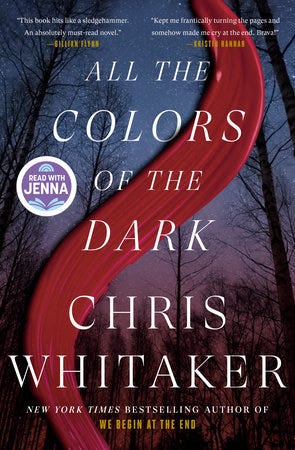All the Colors of the Dark, by Chris Whitaker
This is the fattest novel I read in a summer full of them. But don’t let the 600 pages frighten you — the story unspools in very short chapters and after just a few, I was hooked. In the small Missouri town of Monta Clare in 1975, 13-year-old Patch saves a rich local girl, Misty, from an assault, only to be abducted in her place and spend a year in captivity with a mysterious girl, Grace, as his only company. Meantime, his best friend Saint (yet another young girl) is conducting her own freelance investigation to find him. Patch, Misty, and Saint’s experiences will send them on paths that diverge, then come back together, into adulthood and over decades. There’s a lot in here: several mysteries — who is Grace and what has become of her? who killed the girls whose bodies are turning up near Monta Clare? — the lasting effects of trauma, beekeeping, bank robbery, and the ties that bind both biological and found families. It’s an atmospheric, absorbing book with an air of myth to it and — important given the time investment — a satisfying ending.
The God of the Woods, by Liz Moore
In what I promise is a coincidence, here’s another book about missing children that begins in 1975. In the middle of the night, 13-year-old Barbara Van Laar disappears from her cabin at Camp Emerson, a summer camp in the Adirondacks owned by her wealthy, cold family. The Van Laars have already experienced great loss; more than a decade earlier, Barbara’s brother Bear vanished into the thick woods surrounding the camp and the family’s compound, and was presumed dead at the hands of a local man. Moore uses flashbacks to set up the troubled relationship between Bear and Barbara’s parents, Peter and Alice, and to illustrate the complicated dynamics between the Van Laar family and the working-class residents of nearby Shattuck. We meet Barbara’s counselor, Louise, who is dating a family friend of the Van Laars; Tracy, who becomes Barbara’s best friend at camp; Judy, an investigator working on the case, and Jacob Sluiter, a serial killer who has just escaped from prison and is working his way back home through the woods. Sad and wonderful. If you’re looking for a book to get lost in as summer winds down, you can’t do better than this.
Long Island Compromise, by Taffy Brodesser-Akner
At first, Brodesser-Akner’s second novel seems to be about an age-old dynamic: early generations rise and grind for years to build wealth and give their kids everything they never had, while subsequent generations languish without a purpose, knowing they will always be taken care of. But as the author has said, the book is really about trauma, who gets to claim it and how we deal with it. The instigating trauma here is the 1980 kidnapping of Carl Fletcher, whose Jewish father survived the Holocaust and later made his fortune in America through a packaging-materials company. Carl was held captive and abused, but ultimately reunited with his family after his wife paid a ransom, their two terrified young sons in the backseat as she raced to the drop-off spot. Carl tried to forget the incident and move on with his life, which didn’t work very well, and his kids — who inherited both the emotional fallout from the kidnapping and hefty regular dividends from the family business — are coping in their own (sometimes hilariously) dysfunctional ways. The characters are complicated, the dialogue is snappy and true, and the conclusion is spot-on.





